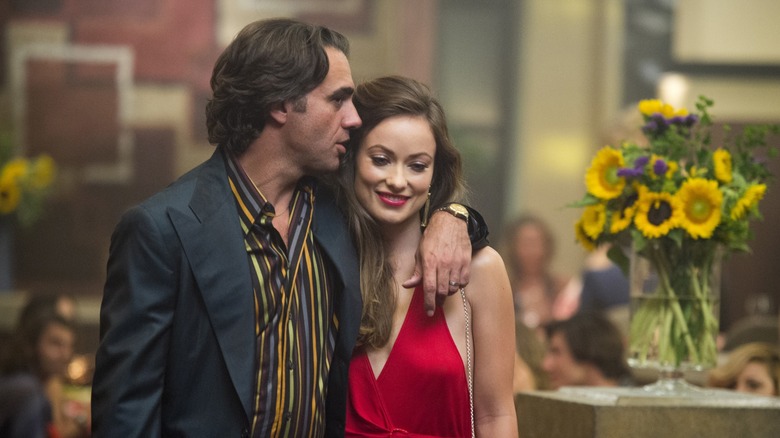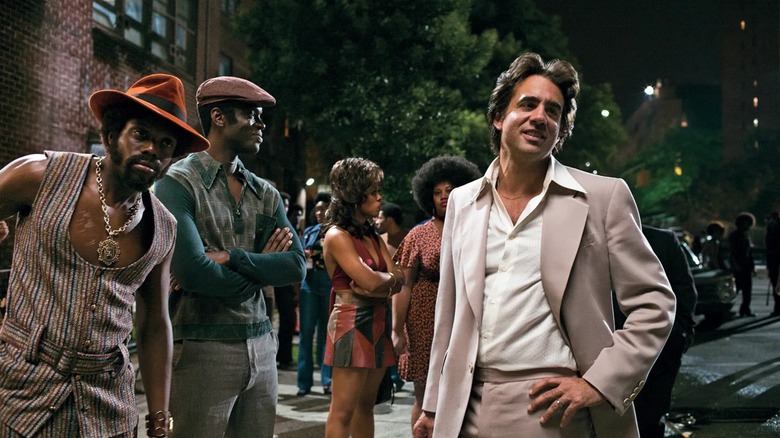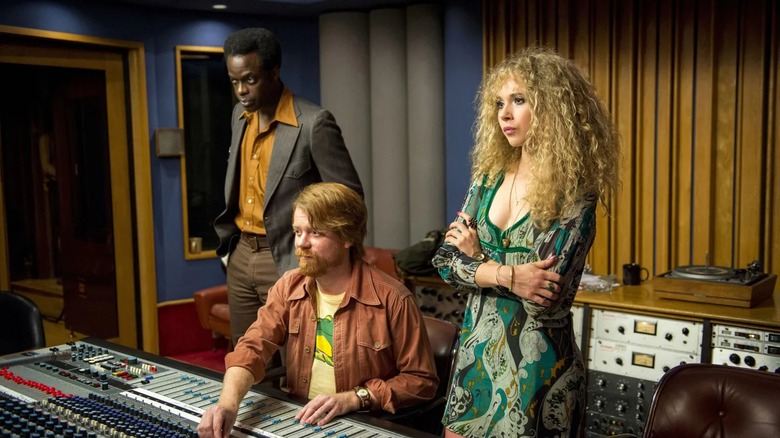Why HBO Canceled Martin Scorsese's Vinyl After One Season
Martin Scorsese's long and illustrious career in film requires no introduction. But has the legendary director ever dabbled in television? The answer is yes. From overseeing a few episodes of the HBO period drama "Boardwalk Empire" to helming the Netflix docuseries "Pretend It's a City," Scorsese has worked in the medium a few times over the years. In 2016, he was even involved in a rather ambitious television project: another HBO period drama titled "Vinyl," which he created in collaboration with Mick Jagger, Rich Cohen, and Terence Winter. The core idea was to capture the glamor and nostalgia of the record industry in the 1970s, complete with raucous spectacle and, maybe, a sprinkle of hedonistic excess.
However, the problem with "Vinyl" — which starts off strong thanks to its Scorsese-directed pilot — is precisely this desperate celebration of excess. Without something powerful or substantial to ground it, "Vinyl" fell into its genre trappings of nostalgia bait and began to flounder after a point. While HBO initially planned to renew the show for a second season, the decision was later reversed, and the show was ultimately canceled after its 10-episode first season. To understand HBO's reasoning better, let's take a look at what head of programming Casey Bloys had to say about the show's cancellation in 2016 (per Deadline):
"It didn't land. With limited resources, we didn't think the retooling was worth the producers' time if it would only move the needle a little bit. We will more carefully consider things; it's not something that I'd like to do or relish doing going forward."
While this is an understandable business decision, Bloys' statement paints an incomplete picture of "Vinyl," its ethos, and what it failed to achieve despite the involvement of talented creatives. Moreover, it's worth our time to dig deeper and examine the vision that shaped the project, as well as whether things would've been different if Scorsese was more involved with the HBO series.
Vinyl was expected to achieve HBO prestige drama status, but it failed
Let me set the scene for the Scorsese-directed, mega-expensive ($30 million!) two-hour opener for "Vinyl." The year is 1973, and label owner Richie Finestra (Bobby Cannavale) is on the verge of selling his company, a decision that comes with a distribution agreement with Led Zeppelin. That's good news, but a weird encounter with Robert Plant (Zebedee Row) makes it clear that the sale might not happen at all. At this point, Richie is clearly stressed and straight-up not having a good time ... until he does a few lines of coke and watches the glamorous New York Dolls stylishly belting out their hit single, "Personality Crisis."
Scorsese weaves in and out of personal, contained moments and charged communal spaces without effort in the episode, forgoing pathos in favor of focusing on the vulgar excess of living in the moment without a care about consequences. Quiet moments of anxiety or interpersonal conflict are stamped out by the spectacle of rock and roll, as Richie is simply trying to live it up and get what he (thinks he) deserves after a string of bad decisions. In the hands of a lesser director, this opener would be a slog, but Scorsese crafts a rich tapestry depicting a bygone culture that doesn't seem as cool or aspirational today, even with our rose-tinted glasses on.
But "Vinyl" isn't trying to satirize this sentiment, as its hedonistic heart is as sincere as Richie's belief that he is not having an existential crisis. With Scorsese's involvement as director, these cliched, borderline-boring tropes work, but not so much in his absence. If anything, "Vinyl" loses its way completely by its third episode, regurgitating story beats we have seen a million times before.
Speaking of which, what did Scorsese have to say about his short-lived HBO drama? The director expressed his sentiments during the 2018 Rome Film Festival, lamenting the fact that he didn't have a more hands-on involvement in the show (via The Hollywood Reporter):
"It was ultimately tragic for me because we tried for one year. I did the pilot. We tried for one year with HBO, but we couldn't get the creative elements together. It was something that I realized, in order to make it right [...] I think I would have had to direct every episode and be there for the three to four years."
There's more to Vinyl's cancellation than meets the eye
While it is true that Scorsese's steady involvement might have salvaged "Vinyl" (much like it did on "Boardwalk Empire"), we need to talk about the quality of the show's post-pilot episodes. Are they really that bad? To be frank: no. The ratings and viewership numbers were not impressive, but they weren't abysmal either. Despite its mess of regurgitated genre tropes, a good chunk of its audience enjoyed "Vinyl," with the critical consensus also leaning towards the positive. (The show currently holds a 74% on Rotten Tomatoes.)
So, what were the reasons behind HBO abruptly cancelling "Vinyl" after having already announced its renewal? According to Cannavale, HBO dropped the ball while planning the show's release strategy, creating circumstances that the cast and crew had no control over. As the actor explained to Vanity Fair in 2024:
"You can Monday-morning quarterback these things: We really were screwed out by circumstances that we didn't have any control over. Whether it was the fact that HBO didn't promote it as a new Martin Scorsese movie; they didn't let their audience know it was a two-hour pilot; they didn't really take advantage of what they had; they premiered us after 'Girls' — didn't make any sense. We premiered at 10 at night for a two-hour pilot."
Cannavale also felt personally responsible for the criticism levied against the series, feeling he had "let Marty down" and that HBO's reversal of the decision to renew "Vinyl" was "like a double f***-you." While it's understandable why Cannavale might have felt that way as the face of this short-lived show, the onus of responsibility shouldn't fall on one person. Moreover, the business side of things often outweighs artistic merit or sincere effort, and that might be just the case with the fate of this series.
"Vinyl" was an expensive affair that was supposed to celebrate the flawed, glamorous lives of real musicians and the culture surrounding the music industry at the time. The show's failure to meet projected expectations reflected poorly on HBO, as it was unable to churn out a profitable prestige drama even with such prolific names attached. Whatever the case, Richie Finestra's dreams of a cushy, affluent life have been unceremoniously dashed (though I don't think too many people are up in arms about it).


